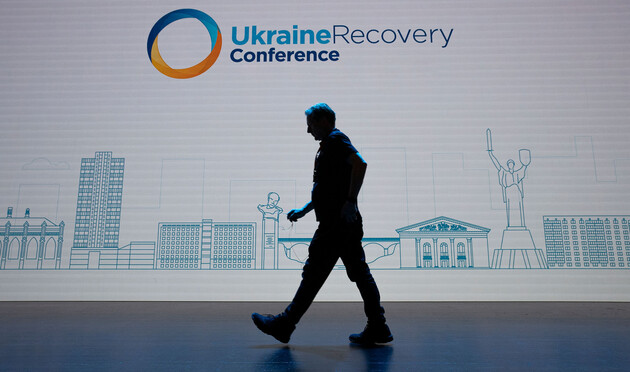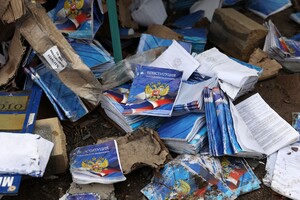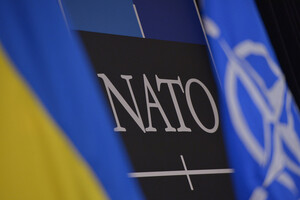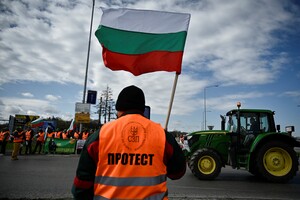From the Luhano Failure to the Ukrainian Breakthrough

The restoration of Ukraine will be the largest project in the world in the last almost 80 years.
Ukraine itself could offer the world a real breakthrough into a new era, namely an advanced model of security and response to challenges, neo-capitalism and new economic models, cyberocracy and a service state with adaptive institutions, a heterarchical ("flat") society, etc.
But instead, we take risks, nurture corruption and outdated economic approaches, and fuel society's paternalism. Thus, we as a society do not find the strength and will to be honest with ourselves and our partners.
Perhaps that is why the world has not yet had institutions and leaders who would take on the role of new Marshalls for the restoration of Ukraine. Dozens of both Ukrainian and international think tanks and universities have proposed their own ideas, but all this remains at the level of well-written documents that few people in power read.Great expectations are placed on the international conferences dedicated to the Ukrainian issue of recovery and assistance, organized at the highest level. Such as those that have taken place since the beginning of large-scale aggression in Lugano, Berlin, Paris in 2022 and the one that should take place in London in June 2023.
Since there is currently no progress in the emergence of leadership, institutions, or at least the Recovery Plan of Ukraine, let's try to understand the reasons for this using the example of Ukraine's preparation for last year's donor Recovery Conference, so as not to repeat the mistakes.
On July 4-5, 2022, the Ukraine Recovery Conference was held in the Swiss city of Lugano, dedicated to planning and financing the recovery of Ukraine.
Many experts believe that the results of this conference will be a failure. In particular, due to the fact that the Recovery Plan was neither officially adopted by Ukraine nor supported by our partners. On the sidelines and after the conference, representatives of our partners were surprised at the lack of a clear vision in the positions of government officials, but most importantly, they criticized that the presented plan was weak and did not meet the expectations of donors. In addition, it was noted that the plan defiantly issued a set of projects, many of which were purely commercial, and totaled 750 billion dollars.
According to official information, 2,500 experts in 24 groups were involved in the preparatory work within the framework of the National Recovery Council in Ukraine. In addition, 200 meetings were held, 2,000 pages of text were prepared, and 900 national projects were collected.
In public, the secretary of the National Council for the Recovery of Ukraine from the War, Mr. Danylo Hetmantsev, also stated about the work of the International Advisory Panel, however, some of its members denied their participation in the actual work on the document (they say, only two meetings were held without consideration of the actual material). Moreover, the experts had numerous comments on the document and did not exactly approve it. The members of the National Council for the Recovery of Ukraine after the War, in fact, never met, since all work was managed by its secretary, effectively monopolizing the council.
So why generally good ideas and plans created by numerous experts in working groups did not become an effective plan?
Reasons for the failure of the Recovery Plan of Ukraine
To summarize, there are several reasons for the failure of the Recovery Plan of Ukraine presented in Lugano.
1. Lack of a specific idea about the country's development
The beginning of the work was to agree on the strategic development of Ukraine. It was necessary to conduct a scenario analysis. The target indicators were supposed to be the result of socio-economic modeling (as it happened during the work on the Concept of National Economic Strategy).
However, all this was not done at the level of process organization. Regarding the work of the coordinators and experts of most groups, it must be said that among those organizational units where they work, self-organization took place in the performance of tasks to determine specific strategies for the development of each sector and the construction of state policy, but this did not correct the inherent methodological error.
2. Lack of real leadership
Andrii Yermak (head of the Office of the President of Ukraine) and Denys Shmyhal (prime minister of Ukraine) were appointed co-chairs of the National Council for the Recovery of Ukraine from the War. Later, a third co-chairman was added – Ruslan Stefanchuk (speaker of the Verkhovna Rada of Ukraine). However, the Secretary of the Verkhovna Rada Committee on Finance, Tax and Customs Policy, Danylo Hetmantsev, took over virtually all coordination.
Why exactly did he take on the main role in leadership? After all, he is a person whom business representatives and experts have pointed to for several years in a row as the representative of economic and socio-cultural ideas hostile to Ukraine. We will leave the answer to this question outside the scope of this text. However, the entire methodology of the work and the final result became hostages of the views of a person who is far from the approaches of modern economy.
And for the country's political leaders, all this work was not a priority. Therefore, in the absence of real leadership in the planning and further implementation of recovery plans for Ukraine, the authorities focus mainly on daily challenges, and the careful preparations for the Recovery Conference have failed.
3. Methodological error
The work of 24 groups and hundreds of experts took place in a loosely structured format, namely "from the bottom up", that is, without the necessary unified basis and coordination.
Lack of strategizing at the state level is probably our biggest mistake since independence. And this is constantly shown by our unpreparedness neither for challenges nor for breakthrough economic and social growth.
4. Impudence, but lack of stated ambitions
We are convinced that Ukraine should become the Next Big Thing for the whole world and, in particular, for the EU.
Ukraine is the answer to the question of modernization of the EU itself, not a burden for our partners.
Ukraine is now demonstrating values forgotten in the West, namely courage, self-activation, humanity, will and sincerity.
Ukraine is like a compressed spring that will be able to demonstrate significant economic and social growth after victory.
Instead, the vast majority of projects, performances, and ideas are outdated and secondary – with a low level of substantiation of declared financial needs.
5. Inconsistency of state policies
The resulting document testifies not only to the inconsistency between developments by sector, but also to the absence of clearly defined state policies, which should be the basis for further planning of actions and projects.
6. Vulgarized inclusiveness
Ukrainian society is based on the principle of heterarchy in its structure. The constant effort of the changing political authorities to neglect civil society sometimes leads to the failure of reforms, sometimes to the organization of resistance, such as the Maidans
In this case, the work of the joint government, expert and public groups, which were large in scope and flawed in methodology, remained only documents, and the secretary of the Ukrainian National Council presented another document to international partners, namely the work of a separate expert team.
So, despite the fact that the plan was well worked out on some levels, it lacked strategic vision and detail. And it was definitely not inclusive and did not meet the aspirations of civil society (for example, in terms of freedoms, particularly economic ones), nor representatives of the National Economic Strategy of Ukraine (which, in particular, had a clear vision), nor socio-economic models.
There is uncertainty between leadership and transparency. The Ukrainian state wants to take the lead in recovery projects. In the eyes of the West, it often looks, according to Valeriy Pekar's apt definition, as "give money and ask nothing." Given the high level of corruption at the state and local levels, political representatives of the West are not satisfied with this approach to solving the problem. Instead, the West itself wants maximum transparency, which in the eyes of Ukrainians looks like "we will not give money, because we know about your corruption, but we will make all the decisions ourselves." Such an approach is obviously unacceptable for Ukraine.
But there is a solution – and we offered it over a year ago. When the problem is not solved, one more reflective dimension is added so that such a solution appears. Instead of a dichotomy ("The West itself allocates money for reconstruction projects" – "Ukraine itself decides what and how to restore with Western money"), a triangle should appear – the third point that enables mutual understanding should be civil society (CS). And in a broad sense: public organizations, volunteers, local leaders, business communities, think tanks, etc. should also participate in deciding the distribution of funds for the reconstruction of Ukraine. In this case, Western partners and civil society jointly implement the anti-corruption agenda, and the government and the State Security together provide Ukrainian leadership in implementing our common vision of how Ukraine should develop and rebuild.
7. Neglect of specifics
While creating ambitious plans, government officials forgot about the Fast Recovery Program. Because of this, de facto Ukraine did not receive not only guarantees for the allocation of 750 billion dollars for the full plan of the country's recovery, but also did not even receive the necessary 17 billion for the current recovery of Ukraine (for 2023, this figure was reduced to 14 billion). It is worth noting that there is a risk that in London everything will be just the opposite and the government will ask partners for only partial coverage of the costs for the rapid recovery of the country, while the global Modernization Plan of Ukraine will be removed from the agenda. At least as of now, there is no visible work on such a plan.
Without immediate restoration, there will be no victory – without the restoration of bridges, roads and power plants, effective defense is impossible. Ukraine must restore the economy as soon as possible so that there are jobs and revenue in the budget. But people do not take their children to places where there are no schools. They do not return to a place where there is no work.
Also, money can come only within the scope of project financing. We need to prepare thousands of projects and thousands of project managers at the local level – and we need to start doing this right now.
8. Concentration on recovery
Although in the latest versions of the document, thanks to the pressure created by our people and the attention given to this issue, modernization plan of Ukraine has already been mentioned, but the main work was carried out in the format of restoration. Also, the lack of agreed state policies, which would provide for the modernization of society, human capital, economy, socio-political relations and the law enforcement system, influenced the simplified nature of the solutions proposed in the plan.
There should be no contradictions between recovery, European integration and modernization. Ukraine must modernize before European integration in order not to remain the poorest country in Europe, because deregulation, tax reform, reforms in the field of human capital development, debureaucratization of the state are easier to carry out on the eve of joining the EU. Instead, modernization is impossible without the rapid restoration of the basic infrastructure and the return of labor resources. However, recovery outside the context of modernization of our country increases the risk that our international partners will consider support for the survival of Ukraine as a sufficient level of aid, and in Ukraine itself the post-Soviet system in the economy, education, health care, public administration, etc. will be preserved.
Thus, unfortunately, the process of strategizing does not exist in the state either as an institution or as a model of thinking of state leaders. There are no institutions for the development of the strategy during all the years of independence. But this fact can and should be changed.
Ahead of the big conference in London, we – both government and society – need to do our "homework": establish cooperation and agree on a vision and at least a high-level action plan for recovery and modernization, including the Program for fast recovery of Ukraine.
International partners expect Ukraine to present both solutions at the level of state policies and specific project solutions in key areas. In addition, it is expected that Ukraine will offer a transparent and inclusive architecture for the financing and administration of the implementation of the plans. Also, our state must fulfill its obligations regarding judicial and anti-corruption reforms. The goal of the process, in which the conference in London is another link, is to create such a system that will enable the search, accumulation and receipt of financial resources and their spending for the benefit of the people of Ukraine and the common good of us and our strategic partners.
Otherwise, hundreds of billions of aid and investments for the reconstruction of Ukraine justified by international partners will remain only unrealized hopes, and Ukraine will receive funds to cover the state budget deficit only during military actions.
Read more about how to form the Recovery and Modernization Plan of Ukraine in the next article, which ZN.UA will publish tomorrow.
Read this article in russian and Ukrainian.
Please select it with the mouse and press Ctrl+Enter or Submit a bug
















 Login with Google
Login with Google